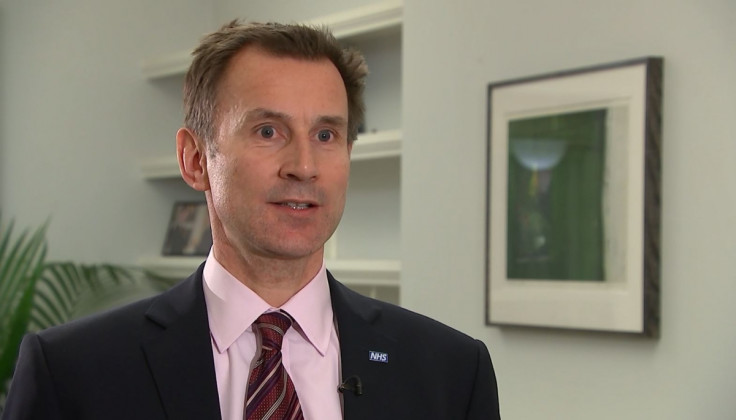Jeremy Hunt accuses the BMA of being 'totally irresponsible' ahead of junior doctors' strike

Jeremy Hunt has accused the British Medical Association (BMA) of behaving in a "totally irresponsible way" ahead of the planned 10 February strike. The health secretary said the union had spread "misinformation" to its members about proposed contract changes and "distorted" his words in the media.
He said junior doctors were angry because "they were told by the BMA that their pay was going to be cut", but he insisted that it would not. "They were told that they were going to be asked to work longer hours, they aren't," he told the BBC's Andrew Marr Show.
"We are actually bringing down the hours they work," he said. "If you are told by your union that the health secretary wants to do these awful things, of course you feel devalued."
"It is incredibly disappointing that the totally irresponsible way that the BMA has behaved in refusing to sit down and talk about how we can improve patient care and spreading misinformation that those doctors," he added.
Dr Johann Malawana, the BMA's junior doctor committee chair, disputed the health secretary's claims and accused the government of "putting politics before reason" when it came to the new contract, adding they had been left with no option but to strike.
"This action is wholly avoidable but Jeremy Hunt's shambolic mishandling of this situation means he risks alientaing a generation of junior doctors and undermining the delivery of future patient care," he said.
This was "why 98% of those junior doctors who voted, supported taking industrial action," he added.
"Junior doctors already work around the clock, seven days a week and they do so under their existing contract," he said. "If the government want more seven-day services then, quite simply, they need more doctors, nurses and diagnostic staff, and the extra investment needed to deliver it."
Other medics social media to pour scorn on the the health secretary's claims. Dr Kailash Chand OBE, a former GP and ex-chair of an NHS Trust accused Hunt of peddling "spin and lies about weekend mortality".
#marr @Jeremy_Hunt continues to peddle spins and lies about weekend mortality. We trust @fgodlee any time on this. #getfacts right MrHunt!
— Dr Kailash Chand OBE (@KailashChandOBE) February 7, 2016
Expanding on this to the IB Times UK, he said accused the health secretary of "Mr Hunt deliberately and knowingly" misquoting and misinterpreting" the conclusions of medical research about weekend mortality.
Another doctor Neeraj Singh said he had made up his own mind about the contracts.
I've worked in 9 diff hospitals over the last 13 yrs+have never knowingly met a BMA rep. I made up my own mind. @Jeremy_Hunt lies #marr
— neeraj singh (@redneeraj) February 7, 2016
However, Hunt insisted the government had made it "absolutely clear that we don't want to cut junior doctors pay", adding that "for the majority of them it will go up".
He said transitioning to the new junior doctors contract would cost the country more in the short term, "but when we move to the new contract in four years' time the total amount going into the junior doctors pay packet will be higher, not lower," he said.
"In the end, if you're going to ask more doctors to work at weekends you are going to have to pay more, but in order to be able to afford that we do need to reduce the premiums that we pay at weekends and make up for it with an increase in base pay," he said.
He added that after making the transition, "junior doctors will get a higher premium for working at weekends than the nurses working in the same hospital, the ambulances drivers who take people to the same hospital, than the porters, than the cleaners".
Hunt also promised that the cost of the new junior doctors contracts to the NHS will not increase after the transition, and it will remain revenue neutral.
"The sad thing about this is that what I want to do is what every single doctor wants to do – they want to give the highest standard of care to their patients," he said.
© Copyright IBTimes 2024. All rights reserved.





